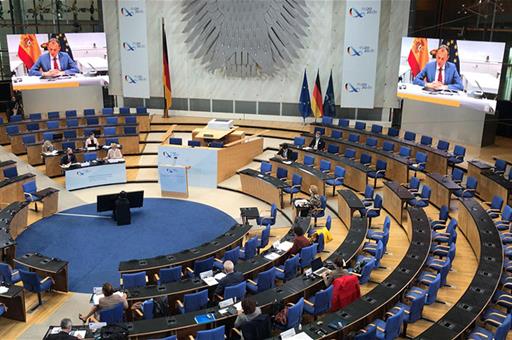Spain backs European Research Area's focus on improving scientific careers and strengthening strategic cooperation
News - 2020.10.20
Pedro Duque underlined Spain's support for the focus that the new European Research and Innovation Area (ERA) places on encouraging the careers of research staff , particularly of young researchers, and the commitment to strengthening cooperation between Member States through the implementation of strategic joint agendas in specific areas where research and innovation are essential elements for their development.
Minister Duque took part in the Ministerial Conference organised by the German Rotating Presidency of the EU to discuss the European Research Area, which is being revised 20 years after its creation, with the aim of boosting the free movement of researchers, scientific knowledge and innovation, and of making European industry more competitive.
At this meeting, which involved the participation of EU science ministers, Minister Duque conveyed the government's full support for strengthening research careers, in the conviction that Europe must make an effort to retain and attract the best talent. In its communication on the new ERA, the EU authorities set the goal of improving opportunities for professional development to attract and retain the best researchers in Europe, as well as to incentivise researchers to follow a career outside of the academic world and thus proposes setting in motion a set of support tools for the professional careers of researchers at the end of 2024 and in collaboration with Member States and research organisations.
Minister Duque, who also highlighted the commitment to closely collaborate in achieving this goal under the upcoming Portuguese Presidency of the Council of the EU, explained that Spain has already commenced a structural reform process to enhance the stability of scientific careers, through the introduction of the figure of the 'tenure track', and to improve the capacity to retain and attract talent.
Spain also agrees on the need for the ERA to prioritise excellence and research to guarantee the maximum impact on society and the economy, as maintained by the current German Presidency of the Council. Minister Duque argued that fundamental research and research on the frontier of knowledge is the basis for the development of future breakthrough technologies, to which end transfer policies and those to strengthen small- and medium-sized innovative enterprises must be supported.
The minister also pass on the government's full support for the importance that the new European Research Area assigns to gender equality and the incorporation of the gender perspective in research. "We are proud to stand among the most active countries in this field, and we must harness all the talent possible", he highlighted.
As regards cooperation and collaboration between EU Member States, Pedro Duque also advocated the joint introduction of strategic research and innovation agendas. In this regard, he explained that the Spanish Science, Technology and Innovation Strategy 2021- 2027, already presented by the government, includes this goal and commits to co-promoting joint initiatives at a European level.
Bonn Declaration on freedom of scientific research
After the first debate, the Ministerial Conference continued with a morning session to address the initiative of the German Presidency in favour of the freedom of scientific research, which culminated in the signing of the Bonn Declaration.
Minister Duque underlined that the freedom of science strengthens European scientific research and is one of the common values that should be shared with international allies.
In this context, Spain proposed the creation of a European Observatory on the Freedom of Scientific Research, which could monitor different practices and conduct, and could research claims made by scientists, whether within the EU or from countries with which it cooperates.
The Bonn Declaration places the freedom of scientific research as a fundamental value of the European Research Area, and as a guiding feature on international scientific cooperation. The aim is that the signing of this Declaration marks the start of dialogue between governments, science and society to strengthen scientific research to the benefit of society.
As well as the EU-27, the debate on the freedom of scientific research was also attended by partner countries from other regions, such as Australia, Brazil, Japan, Canada, Iceland, Israel, Liechtenstein, Namibia, Norway, New Zealand, the Republic of Niger, Singapore, South Korea, Switzerland, the United Kingdom and the United States, as well as the African Union.
Non official translation





